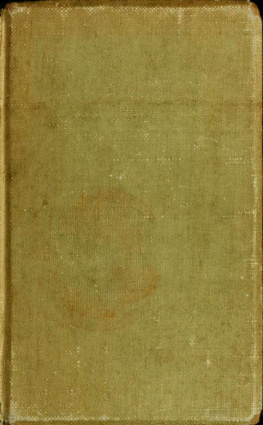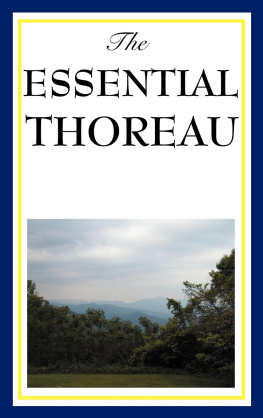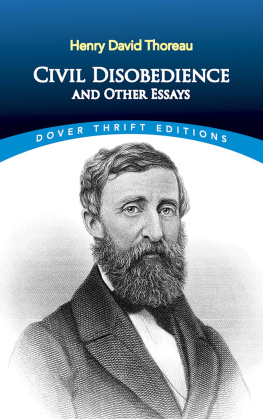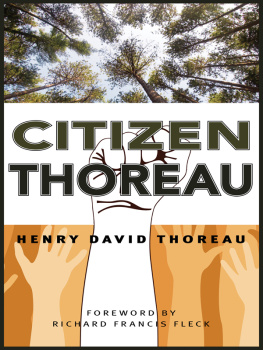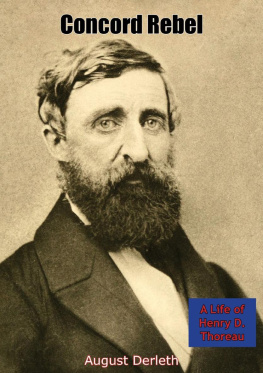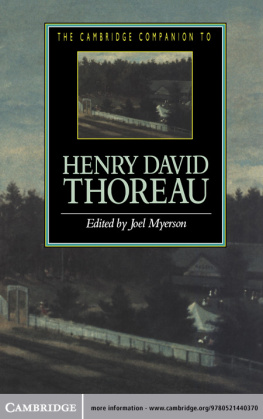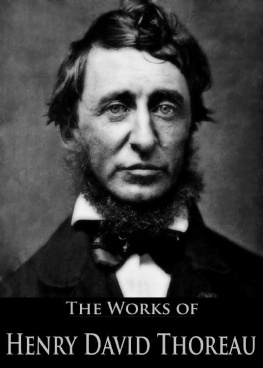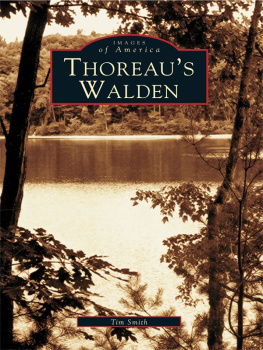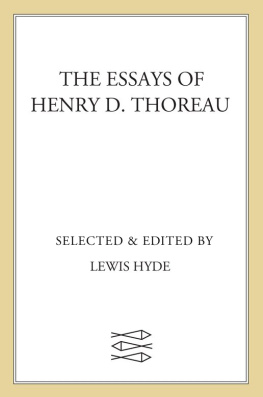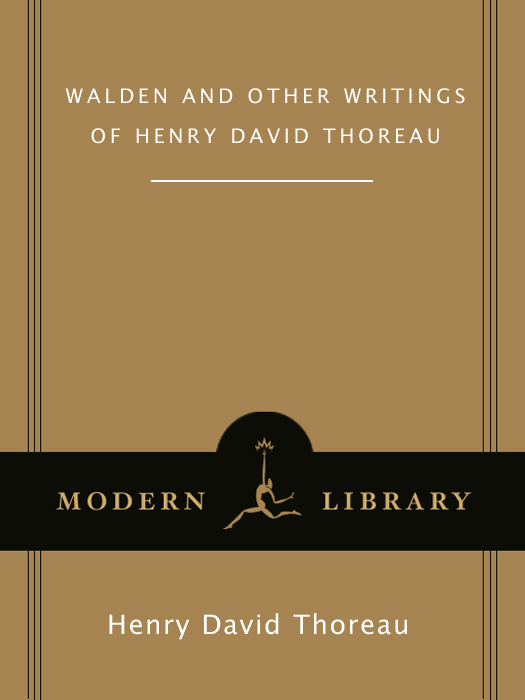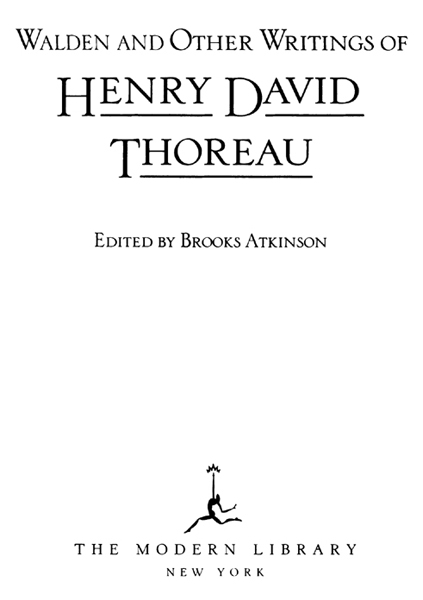1992 Modern Library Edition
Biographical note copyright 1992 by Random House, Inc.
Copyright 1937, 1950, 1965 by Random House, Inc.
All rights reserved under International and Pan-American Copyright Conventions. Published in the United States by Random House, Inc., New York, and simultaneously in Canada by Random House of Canada Limited, Toronto.
Modern Library and colophon are registered trademarks of Random House, Inc.
LIBRARY OF CONGRESS CATALOGING-IN-PUBLICATION DATA
Thoreau, Henry David.
[Selections. 1992]
Walden and other writings of Henry David Thoreau/edited by Brooks Atkinson.Modern Library ed.
p. cm.
eISBN: 978-0-679-64202-2
I. Atkinson, Brooks, 18941984. II. Title.
PS3042.A7 1992
818.309dc20 92-50225
Modern Library website address: www.modernlibrary.com
v3.1
HENRY DAVID THOREAU
Henry David Thoreau was born on July 12, 1817, in Concord, Massachusetts. His father worked successively as a farmer, a grocer, and a manufacturer of pencils, and the family was frequently in difficult financial straits. After studying locally, Thoreau won admission to Harvard. When Ralph Waldo Emerson moved to Concord in 1835, Thoreau formed a close relationship with him (although the friendship would later give way to mutual criticism) and with others associated with the Transcendentalist group, including Margaret Fuller, Orestes Brownson, Bronson Alcott, Jones Very, and Theodore Parker. He worked in his fathers pencil business while keeping the journals that would become his lifes work, running to millions of words.
Thoreau took over the Concord Academy for several years, where he taught foreign languages and science, before closing the school in 1841. By now he was regularly publishing poems and essays in The Dial For a time he worked in Emersons household as a handyman, and in 1845 he built a cabin on some property of Emersons at Walden Pond, staying for a little over two years: My purpose in going to Walden Pond was not to live cheaply nor to live dearly there, but to transact some private business with the fewest obstacles. (During this time he maintained an active social life in Concord.) He spent a night in jail in 1846 as a protest against slavery, and later explained his motives in the essay Civil Disobedience (1849). His first book, A Week on the Concord and Merrimack Rivers (1849), most of which had been written at Walden Pond, was based on a boat trip he took some years earlier with his brother. The book made little impact and sold only a few hundred copies.
Thoreauwho at this time was supporting himself as a surveyorbecame increasingly involved in the Abolitionist movement and began to work for the Underground Railroad, sheltering escaped slaves en route to Canada.
Walden, on which he had been working ever since his residence at the pond, went through multiple revisions before he considered it ready for publication. This was intended as the fullest expression of his philosophy: Be a Columbus to whole new continents and worlds within you, opening new channels, not of trade, but of thought. Every man is the lord of a realm beside which the earthly empire of the Czar is but a petty state, a hummock left by the ice. It was published in 1854 and proved unexpectedly successful.
Thoreau met John Brown in 1857, and following Browns raid on Harpers Ferry delivered A Plea for Captain John Brown in his defense: I know that the mass of my countrymen think that the only righteous use that can be made of Sharpes rifles and revolvers is to fight duels with them, when we are insulted by other nations, or to hunt Indians, or shoot fugitive slaves with them, or the like. I think that for once the Sharpes rifles and the revolvers were employed in a righteous cause. For many years Thoreau had been at work on a projected study of American Indians, compiling thousands of pages of notes and extracts, and in 1861 he traveled to Minnesota, where he visited the Lower Sioux Agency at Redwood. By this time, however, he had contracted tuberculosis and it became clear that he would not live long; he died on May 6, 1862. His later travel writings, The Maine Woods (1864) and Cape Cod (1865), were published posthumously.
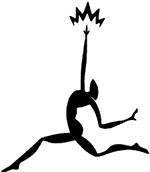
CONTENTS
WALDEN
[Thoreau lived at Walden Pond from July 4, 1845,
to September 6, 1847. Walden was published
in 1854.]
ECONOMY
When I wrote the following pages, or rather the bulk of them, I lived alone, in the woods, a mile from any neighbor, in a house which I had built myself, on the shore of Walden Pond, in Concord, Massachusetts, and earned my living by the labor of my hands only. I lived there two years and two months. At present I am a sojourner in civilized life again.
I should not obtrude my affairs so much on the notice of my readers if very particular inquiries had not been made by my townsmen concerning my mode of life, which some would call impertinent, though they do not appear to me at all impertinent, but, considering the circumstances, very natural and pertinent. Some have asked what I got to eat; if I did not feel lonesome; if I was not afraid; and the like. Others have been curious to learn what portion of my income I devoted to charitable purposes; and some, who have large families, how many poor children I maintained. I will therefore ask those of my readers who feel no particular interest in me to pardon me if I undertake to answer some of these questions in this book. In most books, the I, or first person, is omitted; in this it will be retained; that, in respect to egotism, is the main difference. We commonly do not remember that it is, after all, always the first person that is speaking. I should not talk so much about myself if there were anybody else whom I knew as well. Unfortunately, I am confined to this theme by the narrowness of my experience. Moreover, I, on my side, require of every writer, first or last, a simple and sincere account of his own life, and not merely what he has heard of other mens lives; some such account as he would send to his kindred from a distant land; for if he has lived sincerely, it must have been in a distant land to me. Perhaps these pages are more particularly addressed to poor students. As for the rest of my readers, they will accept such portions as apply to them. I trust that none will stretch the seams in putting on the coat, for it may do good service to him whom it fits.
I would fain say something, not so much concerning the Chinese and Sandwich Islanders as you who read these pages, who are said to live in New England; something about your condition, especially your outward condition or circumstances in this world, in this town, what it is, whether it is necessary that it be as bad as it is, whether it cannot be improved as well as not. I have travelled a good deal in Concord; and everywhere, in shops, and offices, and fields, the inhabitants have appeared to me to be doing penance in a thousand remarkable ways. What I have heard of Bramins sitting exposed to four fires and looking in the face of the sun; or hanging suspended, with their heads downward, over flames; or looking at the heavens over their shoulders until it becomes impossible for them to resume their natural position, while from the twist of the neck nothing but liquids can pass into the stomach; or dwelling, chained for life, at the foot of a tree; or measuring with their bodies, like caterpillars, the breadth of vast empires; or standing on one leg on the tops of pillars,even these forms of conscious penance are hardly more incredible and astonishing than the scenes which I daily witness. The twelve labors of Hercules were trifling in comparison with those which my neighbors have undertaken; for they were only twelve, and had an end; but I could never see that these men slew or captured any monster or finished any labor. They have no friend Iolaus to burn with a hot iron the root of the hydras head, but as soon as one head is crushed, two spring up.



